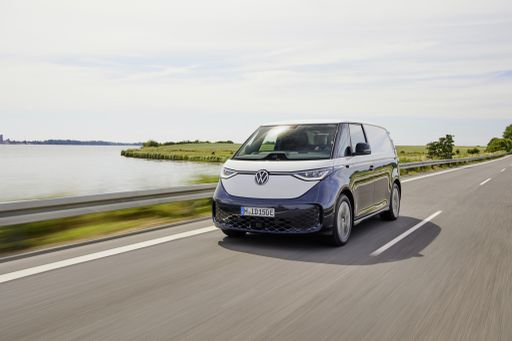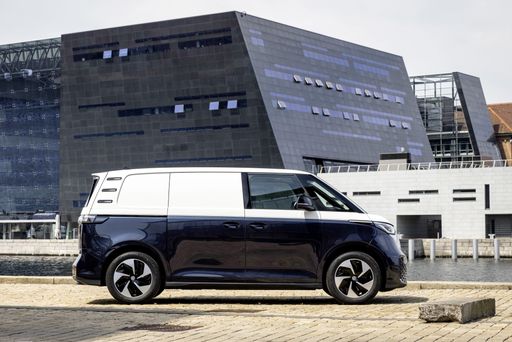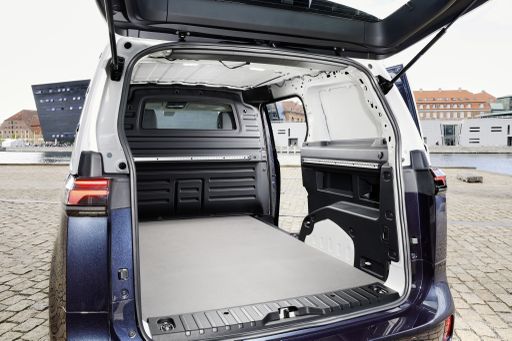VW ID. Buzz Cargo vs Maxus Deliver 7 - Differences and prices compared
Costs and Efficiency:
When it comes to price and running costs, the biggest differences usually appear. This is often where you see which car fits your budget better in the long run.
Maxus Deliver 7 has a significantly advantage in terms of price – it starts at 30600 £, while the VW ID. Buzz Cargo costs 43600 £. That’s a price difference of around 12975 £.
In terms of energy consumption, the advantage goes to the VW ID. Buzz Cargo: with 19.20 kWh per 100 km, it’s significantly more efficient than the Maxus Deliver 7 with 26.90 kWh. That’s a difference of about 7.70 kWh.
As for range, the VW ID. Buzz Cargo performs somewhat better – achieving up to 455 km, about 85 km more than the Maxus Deliver 7.
Engine and Performance:
Power, torque and acceleration are the classic benchmarks for car enthusiasts – and here, some clear differences start to show.
When it comes to engine power, the Maxus Deliver 7 has a minimal edge – offering 353 HP compared to 340 HP. That’s roughly 13 HP more horsepower.
In terms of top speed, the performs better – reaching , while the tops out at . The difference is around .
There’s also a difference in torque: VW ID. Buzz Cargo pulls distinct stronger with 679 Nm compared to 515 Nm. That’s about 164 Nm difference.
Space and Everyday Use:
Beyond pure performance, interior space and usability matter most in daily life. This is where you see which car is more practical and versatile.
Seats: offers more seating capacity – vs .
In curb weight, VW ID. Buzz Cargo is slight lighter – 2264 kg compared to 2360 kg. The difference is around 96 kg.
In maximum load capacity, the Maxus Deliver 7 performs decisively better – up to 7200 L, which is about 3300 L more than the VW ID. Buzz Cargo.
When it comes to payload, Maxus Deliver 7 clearly perceptible takes the win – 1140 kg compared to 753 kg. That’s a difference of about 387 kg.
Who comes out on top?
Overall, the Maxus Deliver 7 shows itself to be offers a more balanced package and secures the title of DriveDuel Champion.
It convinces with the more balanced overall package and proves to be the more versatile choice for everyday use.

Maxus Deliver 7
Costs and Consumption
View detailed analysis
Engine and Performance
View detailed analysis
Dimensions and Body
View detailed analysis
VW ID. Buzz Cargo
The VW ID. Buzz Cargo marries retro Volkswagen charm with a thoroughly modern electric work van, offering a surprisingly spacious and practical load area wrapped in friendly, iconic styling. It's a smart pick for urban tradespeople and small businesses who want quiet, effortless driving, lower running costs and easy maneuverability — with a healthy dash of nostalgia on the job.
details @ Volkswagen AG / VW Media
@ Volkswagen AG / VW Media
 @ Volkswagen AG / VW Media
@ Volkswagen AG / VW Media
 @ Volkswagen AG / VW Media
@ Volkswagen AG / VW Media
Maxus Deliver 7
The Maxus Deliver 7 shows up like the sensible workhorse every small fleet owner secretly wants, marrying a cavernous load area with a surprisingly composed drive that turns city streets into a stress-free route. It won't win any beauty contests, but with practical ergonomics, low running costs and a no-nonsense attitude, it makes delivery days feel less like a slog and more like efficient business.
details
 @ Volkswagen AG / VW Media
@ Volkswagen AG / VW Media
|
|
|
|
|
Costs and Consumption |
|
|---|---|
|
Price
43600 - 51400 £
|
Price
30600 - 53000 £
|
|
Consumption L/100km
-
|
Consumption L/100km
8 L
|
|
Consumption kWh/100km
19.2 - 20.3 kWh
|
Consumption kWh/100km
26.9 - 28.2 kWh
|
|
Electric Range
330 - 455 km
|
Electric Range
310 - 370 km
|
|
Battery Capacity
59 - 79 kWh
|
Battery Capacity
-
|
|
co2
0 g/km
|
co2
0 - 211 g/km
|
|
Fuel tank capacity
-
|
Fuel tank capacity
-
|
Dimensions and Body |
|
|---|---|
|
Body Type
Cargo Van
|
Body Type
Cargo Van
|
|
Seats
3
|
Seats
3
|
|
Doors
4
|
Doors
4
|
|
Curb weight
2264 - 2510 kg
|
Curb weight
2360 - 2595 kg
|
|
Trunk capacity
-
|
Trunk capacity
-
|
|
Length
4712 mm
|
Length
4998 - 5372 mm
|
|
Width
1985 mm
|
Width
2030 mm
|
|
Height
1932 mm
|
Height
1990 - 1999 mm
|
|
Max trunk capacity
3900 L
|
Max trunk capacity
5900 - 7200 L
|
|
Payload
640 - 753 kg
|
Payload
905 - 1140 kg
|
Engine and Performance |
|
|---|---|
|
Engine Type
Electric
|
Engine Type
Electric, Diesel
|
|
Transmission
Automatic
|
Transmission
Automatic, Manuel
|
|
Transmission Detail
-
|
Transmission Detail
Reduction Gearbox, Manual Gearbox
|
|
Drive Type
Rear-Wheel Drive, All-Wheel Drive
|
Drive Type
Front-Wheel Drive, All-Wheel Drive
|
|
Power HP
170 - 340 HP
|
Power HP
148 - 353 HP
|
|
Acceleration 0-100km/h
-
|
Acceleration 0-100km/h
7.2 - 11.6 s
|
|
Max Speed
145 - 160 km/h
|
Max Speed
120 - 160 km/h
|
|
Torque
310 - 679 Nm
|
Torque
330 - 515 Nm
|
|
Number of Cylinders
-
|
Number of Cylinders
4
|
|
Power kW
125 - 250 kW
|
Power kW
108 - 260 kW
|
|
Engine capacity
-
|
Engine capacity
1996 cm3
|
General |
|
|---|---|
|
Model Year
2024
|
Model Year
2024 - 2025
|
|
CO2 Efficiency Class
A
|
CO2 Efficiency Class
A, G
|
|
Brand
VW
|
Brand
Maxus
|
Is the VW ID. Buzz Cargo offered with different drivetrains?
The VW ID. Buzz Cargo is available as Rear-Wheel Drive or All-Wheel Drive.
The prices and data displayed are estimates based on German list prices and may vary by country. This information is not legally binding.
